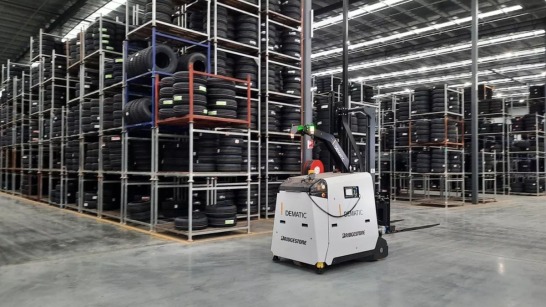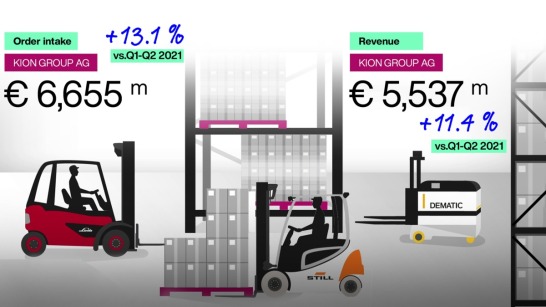Michelin on the Fork, Michelin on the Wheel
However, the partnership between the two quality brands is by no means a one-way street. After all, the STILL forklifts not only transport Michelin tires, they also drive on them. In Ronchi, Turin and Alessandria, The STILL trucks are fitted with tires from CAMSO—the Michelin Group subsidiary specializing in industrial tires.
A few thousand kilometers from the Italian village of Ronchi, another world-class tire manufacturer also relies on products from the KION Group. In Truganina, a sleepy suburb of the Australian city of Melbourne, Bridgestone operates an enormous logistics center, where thousands and thousands of Bridgestone tires are stacked meters high. The site is also home to a fleet of automated guided vehicles (AGVs) from the KION brand Dematic.
Driverless, Controlled by Software
The tires are transported from A to B using metal cables by Dematic counterbalanced AGVs—with no driver at the wheel. Observing the process is like watching a perfectly choreographed dance, all controlled in real time by Dematic software. “The trucks know exactly what they have to do,” says Nick Tzuntzurkas, ANZ National Warehouse Manager at Bridgestone: “They transport and manage product pallets and bring them to selected replenishment and transfer areas.”
Each AGV is a powerful machine that really packs a punch, with a load capacity of 1,500 kilograms and a lifting height of four meters. The trucks are navigated using a laser guidance system that identifies hazards at an early stage and avoids collisions. Even the charging of the lithium-ion batteries is automated—as soon as they are not needed, the AGVs make their own way to the charging platform. “The trucks work long shifts of up to 12 hours,” says Tony Raggio, General Manager of Sales, Mobile Automation at Dematic. “And at the end of such a long working day, the AGV goes to the charging station to recharge its batteries for the next shift.”
This self-contained process is highly automated, safe and efficient, which the customer, Bridgestone, really appreciates. “By implementing this AGV solution, we have been able to increase our efficiency by automating the movement and storage of products throughout the warehouse, without compromising the safety of our warehouse personnel,” says Nick Tzuntzurkas, ANZ National Warehouse Manager at Bridgestone, describing the Dematic system.
A Record-Breaking Partnership
Another subsidiary of the KION Group, Linde Material Handling, also enjoys a close partnership and mutual trust with yet another world-class tire manufacturer, Continental. The collaboration between these two brands is particularly remarkable, with the pair providing a real ‘goosebumps’ moment at the StaplerCup 2018. When it came down to who could do a comprehensive tire change the fastest, the stars aligned for Linde Material Handling and Continental. The Linde trainees gave their all, kept a cool head, and managed a complete tire change of the eight Continental CS20+ solid tires in just 69 seconds, breaking the previous world record of 110 seconds by a long way—and securing an entry in the Guinness Book of Records.




